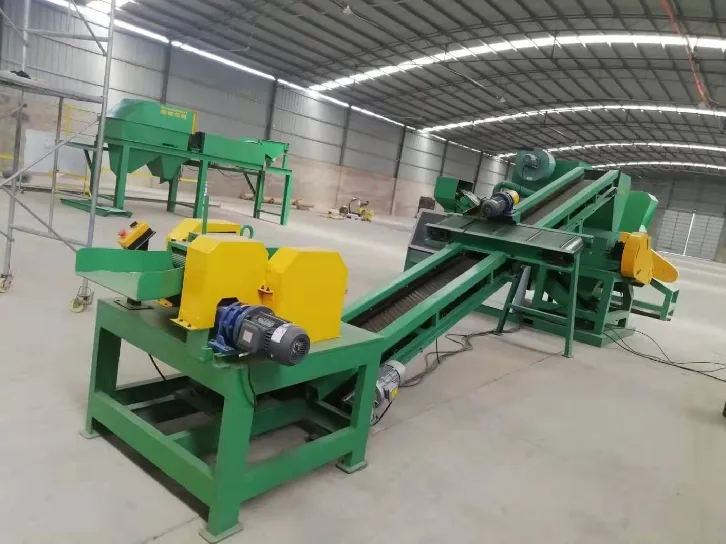

11月 . 11, 2024 09:11 Back to list
The Role of Hammer Crushers in Cement Plants
Cement production is a complex process that involves several key stages, each requiring careful consideration and effective machinery to ensure efficiency and quality. Among the various equipment used in cement plants, the hammer crusher plays a crucial role in the preliminary stages of the production line. This article explores the function, benefits, and operational specifics of hammer crushers within cement plants.
Understanding Hammer Crushers
A hammer crusher, also known as a hammer mill, is a type of crushing machine that uses high-speed rotating hammers to crush materials. It is commonly employed in the initial crushing of raw materials, such as limestone, clay, and other aggregate materials essential for cement manufacturing. The design of the hammer crusher allows for the efficient reduction of large lumps of material into smaller, manageable pieces, which are essential for the subsequent grinding processes.
Importance in Cement Manufacturing
In cement plants, the raw materials must be crushed to a uniform size to ensure consistent quality and performance during the subsequent processing stages. The hammer crusher's ability to produce fine and uniform particles makes it an ideal choice for this application. The crushed material can then be fed into the kiln or grinding mill directly, ensuring a smooth and efficient production flow.
Advantages of Hammer Crushers
1. High Efficiency One of the primary advantages of hammer crushers is their high efficiency in crushing. Their design allows for high-speed operations, enabling the handling of large volumes of material in a short amount of time. This efficiency is critical in a cement plant where time and resource optimization is essential for reducing production costs.
2. Versatility Hammer crushers are versatile and can handle various types of materials, including soft, medium-hard, and hard materials. This adaptability is beneficial to cement plants that may work with different raw material sources.

3. Simple Maintenance Another significant advantage is the simplicity of maintenance. Hammer crushers typically consist of fewer moving parts compared to other crushing equipment, which translates to lower maintenance costs and downtime. Regular inspection and replacement of hammers can keep the machinery in optimal working condition with minimal effort.
4. Cost-Effectiveness While the initial investment in a hammer crusher may vary, the overall cost-effectiveness in terms of operational efficiency and maintenance can be highly beneficial. The long service life and reduced operational costs associated with efficient crushing make hammer crushers a financially sound choice for cement manufacturers.
5. Energy Consumption Efficient hammer crushers consume less energy than other types of crushers, making them an eco-friendly choice. This reduction in energy use aligns well with the growing emphasis on sustainable practices within the cement industry.
Operational Considerations
While hammer crushers come with numerous benefits, certain operational considerations must be addressed to maximize their efficiency. Proper feeding of raw materials is vital; overloading the crusher can lead to jamming and increased wear on the hammers. Additionally, the type and size of the hammers should be chosen based on the specific materials being processed, ensuring optimal performance.
Dust control is another important factor, as cement production can generate significant amounts of dust. Proper enclosure and dust collection systems should be implemented to ensure a safe and clean working environment.
Regular monitoring and maintenance of hammer crushers are essential to uphold their performance and longevity. Operators must be trained to identify worn parts and indicators of decreased efficiency, allowing for timely interventions.
Conclusion
In conclusion, hammer crushers play an integral role in cement plants, contributing to the efficient processing of raw materials. Their high efficiency, versatility, ease of maintenance, and cost-effectiveness make them a preferred choice for many manufacturers. By understanding the operational considerations and implementing best practices, cement plants can optimize their hammer crusher systems, leading to improved overall productivity and material quality. As the cement industry continues to evolve, the hammer crusher will remain a cornerstone of efficient production processes, underpinning the future of cement manufacturing.
Latest news
Troubleshooting Common Eddy Separator Problems
NewsJul.04,2025
The Role of Metal Recycling Plants in Circular Economy
NewsJul.04,2025
The Impact of Recycling Line Pickers on Waste Management Costs
NewsJul.04,2025
Safety Features Every Metal Shredder Should Have
NewsJul.04,2025
How Industrial Shredders Improve Waste Management Systems
NewsJul.04,2025
How Cable Granulators Contribute to Sustainable Recycling
NewsJul.04,2025